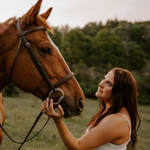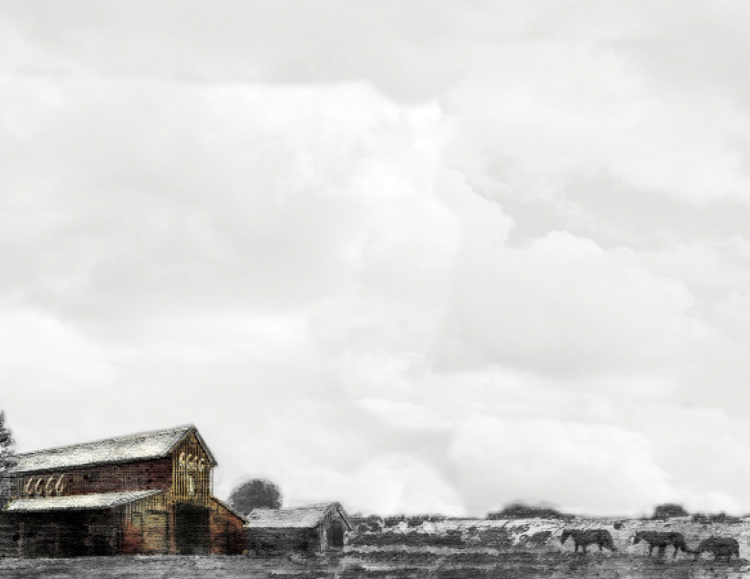Mental health is something we all know is very important.
The month of May is Mental Health Awareness Month, but mental health isn’t just important for humans – it’s important for horses too.
There are a number of things horse owners can do to help with mental stimulation and mental training for horses to keep them happy, healthy, and mentally engaged.
The Importance of Horse Enrichment
Horses in the wild are naturally enriched by their everyday activities. This includes traveling to search for new food and water sources, grazing, herd social interaction, etc.
In a barn or stable setting, however, a horse’s mind is not stimulated the way it would be in the wild.
Overall, the responsibility of this mental stimulation horses need falls to its human caretakers. This is especially true during winter months, or when other inclement weather makes turnout limited. Horses are likely to get bored and have minimal mental stimulation when they are stuck in their stall during these times.
This can result in a horse coping with its lack of mental stimulation by developing bad habits like cribbing, pacing, stall walking, wood chewing, and even exhibiting nervous or aggressive behaviors. Ulcer formation could also be a side-effect of minimal mental stimulation.
Turnout Mental Stimulation For Horses
When a horse is able to move and graze freely in a pasture, this helps mimic natural mental stimulation.
There are even some additional things horse owners can do to enhance the mental stimulation horses have during turnout.
For example, if you’re working with a smaller space, the actual shape of the area your horse is turned out in can be modified to encourage additional stimulation. If the paddock is made narrower with a track-like formation that has food scattered about and water stations on opposite ends of the enclosed area, this encourages movement, interest, and natural food seeking behaviors. This also encourages interaction between other horses in a unique way.
When it comes to the location of where a horse is turned out, it’s ideal if the paddock area can be set up so the horses can see things happening around the farm. Watching people coming and going, observing their owners doing farm tasks, watching dogs or kids playing, etc. can provide additional equine mental stimulation.
Since horses are herd animals, companionship in the form of other horses is crucial. Simply having other horses turned out with your horse creates excellent social and mental stimulation. If the horse must be turned out alone, try to at least turn the horse out close enough to another pasture where they can see and interact with other horses through a fence line if at all possible.
If another horse companion isn’t possible, there are other types of animals that make great companions for horses and provide additional equine mental stimulation, such as goats, donkeys, or cows.
Rolling on the ground is a natural behavior for horses that has a number of mental and physical benefits such as improved skin and coat, improved flexibility, and is also a form of mental comfort for horses. If room allows, create a sand pile in the paddock that really encourages this rolling behavior. Turning a horse out in an indoor or outdoor arena, when possible, also encourages this rolling behavior.
Non-Turnout Mental Stimulation For Horses
While turn out is one of the most ideal situations for the equine mind, unfortunately, it’s not always possible for a number of reasons.
Grazing and food seeking typically happens naturally during turnout, but this can still be accomplished when turnout isn’t an option.
Smaller, more frequent meals are not only healthier for a horse’s digestion, but it also enhances equine mental stimulation.
The use of hay nets or slow feeders stretches the time a horse is grazing on forage, and in turn, increases the feed experience and their mental stimulation. Another way to stretch out the time it takes them to eat grain while encouraging forage behavior is by using feed pan fillers, such as pine cones, old water bottles filled with rocks or tap water, or toilet paper rolls.
Another similar food-related enrichment for horses is to make a scavenging box. This can be done by taking a large cardboard box (just be sure to remove any staples or tape) and hiding horse treats, carrots, or other snacks they enjoy amongst the filler. Many of the filler ideas mentioned above for the feed pan can also be used for burying these treats, such as pine cones. This horsey scavenger hunt helps with sensory and mental enrichment using all five of their senses.
In the summer, an ice block treat is a great way to keep them mentally stimulated and hydrated. Fill a container with water and add in things like carrots, apple slices, grass, hay, and peppermints and then freeze.
Hand walking or grazing is a great way to get your horse out of the stall, in new scenery, and mentally stimulated when injury or other reasons prevent them from being turned out.
A nice long grooming session shouldn’t be overlooked either, as this is a very easy way to provide mental stimulation. As an added bonus, this is a great way to spend some bonding time with your horse!
There are also a number of stall toys or blocks you can purchase that help keep a horse entertained while in their stall.
Mental Training and Active Rest
Training, in and out of the saddle, is great mental stimulation for horses.
Teaching your horse new skills is a great way to not only switch things up from whatever your normal training routine is, but it has the added benefit of being very mentally and physically stimulating.
This change from their normal training is also known as active rest.
The mental training you do with your horse can be completely different from what you normally do, or even a complementary-type skill.
For example, going on a hack around the farm or trail riding when you normally do a lot of arena riding is a great change of pace. Just this change of scenery, even though you are still riding, is mentally stimulating for horses.
For some non-riding activities, you could try training activities that make your horse think, and as an added benefit, might also help with a bit of bombproofing.
An example of this could be a tarp training exercise. This involves laying a tarp on the ground, arranging cones on the tarp, and having your horse follow you through the cones and onto the tarp. You can ask them to back through, walk forward through, or halt on the tarp. This works on ground communication with your horse and is a great way to switch things up.
Any kind of liberty type training on the ground in general is a great way to mentally stimulate your horse and teach them new skills!
And remember, nutrition is the basis of all mental health and wellbeing. If you are hungry, or eating junk, you are unlikely to be in a mental space to learn or explore.
Our 6666 Ranch Nutriments are designed to be the perfect foundational nutrition for your horse to live into his potential. Shop for your horse’s needs here.
Photo by Tom Fisk: https://www.pexels.com/photo/man-in-cowboy-hat-riding-horse-16272427/


